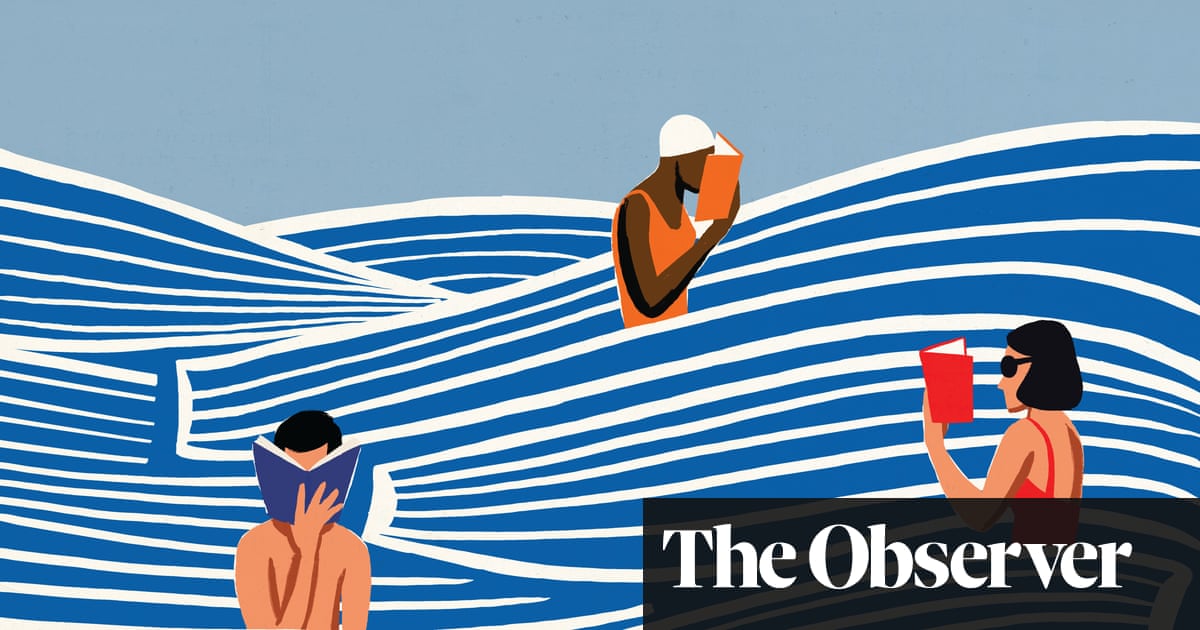
David Nicholls
I’m not sure if it counts as a traditional summer read – there were several moments that made me profoundly anxious – but I loved Claire Kilroy’s frantic, furious account of early motherhood, Soldier Sailor, a horror story at times, but full of love, too. Cecile Pin’s debut, Wondering Souls, manages to be both heartbreaking and hopeful and I’m also looking forward to Paul Murray’s new family saga, The Bee Sting; he’s such a sharp and funny writer.
Zadie Smith
I recently devoured Tomorrow, and Tomorrow, and Tomorrow by Gabrielle Zevin. So enjoyable. I think Susan Sontag’s On Women is perfect if you want to think about the aesthetics of fascism and internecine feminist warfare during the summer – which I find I do. I also just finished Corey Fah Does Social Mobility by Isabel Waidner, out in July. Rare to find a novel with real stylistic and political ambition. Summer is the time for murders set somewhere interesting: Christopher Bollen is the master of these. His latest, The Lost Americans, set in Egypt, is a treat. On my holidays I’ll be packing Kairos because it’s by Jenny Erpenbeck, Nicole Flattery’s Nothing Special – because it sounds intriguing – and The Mess We’re In by Annie Macmanus, because it’s set in the early 00s, in Kilburn, and full of music. Finally, in the hand luggage: The Secret Diaries of Charles Ignatius Sancho by Paterson Joseph. I’ve had that one in manuscript form for over a year but didn’t dare read it because I was in the trenches, writing my own historical novel. Now I can’t wait.
Pankaj Mishra
In Monsters, A Fan’s Dilemma, Claire Dederer asks, with witty self-deprecation, how we should respond to art from artists guilty of morally squalid deeds. The question has become especially volatile in the west as the cultural orthodoxies of a small but powerful minority disintegrate and previously scorned and marginalised voices become more assertive. Instead of rushing to the barricades of ongoing culture wars, Dederer offers – and enacts – a way of thinking that acknowledges the ever growing diversity of intellectual and moral life. You can spend hours dipping into Karl Schlögel’s The Soviet Century, a social history like no other in its careful excavations of lost monuments and forgotten practices. It will be particularly evocative for those – a great part of the world’s population – to whom modernity was once synonymous with the Soviet rather than the American century.
Olivia Laing
Is M John Harrison the best writer at work today? He’s certainly among the deftest and most original, producing immaculately odd sentences in any genre he chooses. Wish I Was Here calls itself an anti-memoir, and there are elements of autobiography swirling through the matrix, but it’s also a manifesto on writing that ruthlessly reassesses the connection between writing and self-knowledge. Better to write from a hidden core, to let sentences eddy from a lost self, to resist familiarity and instead bottle the flagrant strangeness of the world.
Olivia Laing’s latest book is Everybody: A Book About Freedom
Ian Rankin
Susi Holliday is one of our best and most original creators of tense and twisty tales. Her latest, The Street, has got me in its grip. A couple move from England to a new-build housing estate outside Edinburgh. On the first night, their next-door neighbours arrive to help them celebrate. But next morning, those same neighbours have vanished, and others on the estate say the house has never been occupied. Anna needs to find out what’s going on, while at the same time dealing with her crumbling relationship with her partner. Nothing is as it seems and no one can be trusted in this brilliant page-turner.
Ian Rankin’s latest book is A Heart Full of Headstones
Mohsin Hamid
I recently read an advance copy of Heart Tantrums and Brain Tumours by Aisha Sarwari, which comes out later this summer. It is a searing nonfiction account of one woman’s journey in Pakistan through career, marriage, abuse and her husband’s life-shattering cancer.
Mohsin Hamid’s latest novel is The Last White Man
Katherine Rundell
I loved Eleanor Catton’s Birnam Wood. It has the pace and bite and glee of a thriller, coupled with a profound moral seriousness. It burns hot with intelligence and skill; it leaves you breathless. And, for children, I admire everything Sharna Jackson writes: her latest, The Good Turn, is a joyfully witty mystery for nine years and up.
Katherine Rundell’s Super-Infinite: The Transformations of John Donne won the Baillie Gifford prize
Curtis Sittenfeld
I just read a long and very juicy first novel set at an elite American boarding school: Foster Dade Explores the Cosmos by Nash Jenkins. It follows a new student as he navigates privilege, sexual attraction and confusion, and his semi-accidental career as a campus drug dealer. Another new first novel that I absolutely loved is Everything’s Fine by Cecilia Rabess. In New York, in their early 20s, a conservative white guy and a progressive Black woman work together at Goldman Sachs and stumble through their unexpected friendship and budding romance. Rabess and Jenkins are both huge new literary talents.
Colm Tóibín
The House of Doors by Tan Twan Eng is fascinating, engrossing and has given me infinite pleasure. It is set mainly in 1921 in the Straits Settlements of Penang – although there is also a brilliantly evocative sequence set in the Karoo in South Africa – when Somerset Maugham comes to visit. Maugham and his partner are painted with sympathy and wit, but the real triumph of the book is Maugham’s hostess Lesley Hamlyn who is profoundly intelligent and resilient and made for intrigue. She is one of those born noticers and a lesson to us all.
Sara Collins
This spring it seemed everyone was talking about In Memoriam, by Alice Winn. And no wonder. I couldn’t sleep until I’d finished this story of a love affair between two soldiers at the western front, best friends since boarding school who only act on their secret yearning for one another after coming face to face with the brutal pointlessness of war. It’s a novel of admirable historical heft and – even better – of rare, and resonant, empathy.
Jonathan Coe
In The Full English Stuart Maconie pays homage to JB Priestley’s classic English Journey, published in 1934. He does so not by slavishly following Priestley’s footsteps but by making his own sprightly Megabus tour of English hotspots. The deceptive lightness and accessibility of Maconie’s writing lead us gently though what is actually a deep dive into this most mysterious of peoples. Wish I Was Here by M John Harrison is a revival of that most unfashionable of genres, the writer’s memoir (or anti-memoir, as he dubs it), and turns out to be as oblique, slippery and fascinating as any of his fiction.
Maggie O’Farrell
Jacqueline Crooks’s Fire Rush is a heady swirl of a novel that pulls the reader in from the first page. Yamaye frequents basement raves in 1970s London before a sudden tragedy embroils her in a different underworld, that of organised crime and coercive control. Crooks’s assured debut weaves together reality and myth, history and the supernatural: a fabulous, absorbing read. I am very pleased to have Lorrie Moore’s new book, I Am Homeless If This Is Not My Home, on my reading pile. Moore is always a deft, precise writer whose stories bore through to what lies at the core of the human heart, and whose observations acutely pinpoint the world we are living in. Obligatory reading.
Margo Jefferson
What combination of ease and sobriety, pleasure and contemplation do you want this summer? I suggest books that draw on multiple moods, subjects, and landscapes: a memoir with the intensities of a novel; an essay collection with the wholeness of a memoir. I call them polyphonic books. Darryl Pinckney’s memoir, Come Back in September: A Literary Education on
West Sixty-Seventh Street, Manhattan, explores his friendship with the extraordinary Elizabeth Hardwick through subtle registers of aesthetic and social change. The essays in Judith Thurman’s A Left-Handed Woman, roam through literature, art, fashion – through decades of cultural history – with passion and
wisdom.
Dua Lipa
I read the novel On Earth We’re Briefly Gorgeous by Ocean Vuong while on tour and the language often stopped me in my tracks. This summer, I’ll be packing his poetry collection Time Is a Mother. It’s not an obvious beach read, but I’m looking forward to being still and having the space to read and then reread his powerful words.
Dua has recently launched a book club via her Service95 platform.
Anne Enright
Yan Ge’s incredibly varied collection of high-risk, high-impact stories, Elsewhere, is written in exacting prose and also great fun. Her first book in English, after 13 in Chinese; it is strange in a way that is all her own. Soldier Sailor by Claire Kilroy is an existential drama about motherhood of such grip and intensity you will forget you are on a beach. Malcolm MacArthur, the Irish murderer on whose story John Banville drew for The Book of Evidence is also the subject of Mark O’Connell’s nonfiction account A Thread of Violence. This has some of the Banvillian pleasures of stylistic elegance, with a very different moral temperature. A really thoughtful book.
Ali Smith
Two wonderful new novels this year, both beauties, seem to me to be taking realism to powerful heights. Michael Magee’s Close to Home, amazingly a first novel, is about what it’s like to be young and working class right now in Northern Ireland, and is a tremendous read, tensed and immersive, punching the air between hope and despair, deeply decent, unputdownable. Then, following her own fine 2019 debut, The Parisian, Isabella Hammad’s Enter Ghost retells Hamlet for now, dropping its readers deep into the contemporary tensions of the West Bank, asking crucial and layered questions about who’s excluded and who’s included when it comes to the human claims on tragedy and narrative, and is yet more assurance of a calm and vital storyteller, a writer of real rhythmic grace.
Shehan Karunatilaka
In Sri Lanka, it’s summer all year round, a monsoon or three notwithstanding. So most days are good for sitting under trees, in hammocks or on beaches with a good book and not thinking of looming crises. My current summer reads are two very different novels from two very different Sri Lankan writers. Shyam Selvadurai’s Mansions of the Moon is a tenderly and skilfully drawn portrait of Yaśodharā, wife of the Buddha. While Amanda Jayatissa’s You’re Invited is a murder mystery and love triangle, set around a big fat Sri Lankan wedding. Together the books provide a compelling mix of philosophy, character, evocative writing and unexpected thrills.
To explore all the books in the Guardian’s summer reading list visit guardianbookshop.com Delivery charges may apply.












